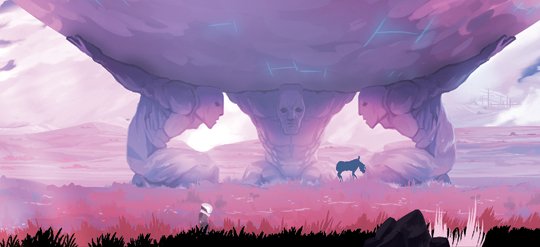A traveler is stranded alone in a deserted world. It is raining, and in the distance a few broken-down machines dot the hills. She begins to walk, and then fly, down the road, her space suit’s jet pack propelling her past some barren trees until she reaches a sculpture of what looks like three giants holding up a boulder. It could be three Atlases. It could be three Incredible Hulks. She is asked to stop and write the opening scene of a story: What is this sculpture? Why is it here?

So opens one level of Elegy for a Dead World, a creative-writing video game launched last December by two Boston-based indie gaming studios, Dejobaan Games and Popcannibal. In the game the player navigates three different deserted worlds—each based on a British Romantic poem—and writes stories or poems inspired by the landscape. As the player’s avatar walks in and out of caves and towers, the game prompts the player to add stanzas or scenes to the poem or story she is composing. When the player reaches the end of the world, she can edit her final piece and publish it to a network platform in order to share it with other players. There are no guns to shoot, no monsters to fight, no points to score, just the challenge of writing a poem or story. “The mantra of this game is to give people a good writing experience,” says Ziba Scott, cofounder of Elegy and head of Popcannibal. “We want to make you feel safe and ready to write.”
From the start, Elegy has not been a traditional video game. When Scott and Elegy cofounder Ichiro Lambe started designing it in October 2013, it was meant to be a weeklong project. Lambe, head of Dejobaan Games, proposed a game in which a player explores a dead civilization. Scott, who credits his awareness of literature to his mother, a retired English teacher, was reminded of Shelley’s sonnet “Ozymandias,” in which a traveler meditates on the ruined sculpture of the titular Egyptian pharaoh. Lambe and Scott sketched out a world inspired by Shelley’s poem and then showed it to a friend and asked for his interpretation. When he came up with a story wholly different from the one Lambe and Scott had imagined, they realized that writing stories could be the goal of the game.
After their initial brainstorm, Lambe and Scott put together a mockup and trailer of the game and shared it with the gaming community. Gamers, writers, and educators responded so enthusiastically that the creators were convinced to set aside their other projects and focus on building the game. With Lambe acting as designer and sound engineer and Scott as designer and programmer, the pair signed on two artists, an additional programmer, and a business developer to join their team. They launched a Kickstarter campaign in September 2014 to fund the project, and twenty-one days later they had raised $72,339 from 3,666 backers, a sum well over their original fund-raising goal of $48,000. The game, which took a little over a year to produce, was launched in December on the online gaming platform Steam and sells for fifteen dollars.
Throughout Elegy’s development, Lambe and Scott worked to make writing approachable. Initially the game offered no writing prompts, but after observing how intimidated early trial players were by writing an original story or poem, the founders decided to add prompts. Each world now offers an array of prompts—in one world, for example, a player can write a letter to a loved one as a stranded traveler, or the story of how this world came to be deserted, or a poem from the perspective of the world’s deposed ruler. Some of the prompts are straightforward and constructed in the style of Mad Libs, while others throw in narrative wrenches that force a player to drastically shift the direction of the story. Scott says that many prompts are written in deliberately simple language in order to bolster a player’s confidence.
The game’s art also helps set the mood for writing, with its vividly colored, dreamy landscapes and its balance of clearly definable objects—bookcases, mirrors, towers—and mystifying fragments of machinery. The three worlds are loosely based on “Ozymandias,” Keats’s sonnet “When I Have Fears That I May Cease to Be,” and Byron’s “Darkness.” Luigi Guatieri, the game’s lead artist, drew on those poems’ themes of the insignificance of man in relation to nature, as well as the work of Romantic painters, to guide his illustrations. “I’ve always been in love with J. M. W. Turner’s landscapes,” says Guatieri. “I wanted to emulate some of his style, but with a sci-fi twist.”
With the game’s unusual premise, it’s no surprise that Elegy has attracted a slightly different gaming audience. “The people who play this are largely people who don’t play games,” says Lambe. “There are no mechanics, there’s nothing to really overcome, so the people who play tend to be a little older than the average gamer audience. The ones who really dig into it tend to be very thoughtful.” Even so, while Dejobaan Games and Popcannibal don’t publicly share their sales figures, Lambe reports that sales for Elegy have been comparable to their more traditional offerings. While other studios have produced storytelling games—Protagonist Labs, for example, is set to release a collaborative storytelling game called Storium later this year—few games are so explicitly focused on writing or so thematically linked to literature.
Educators have also responded positively to Elegy, with more than two hundred elementary schools, high schools, and colleges throughout the world using the game to teach creative writing, language skills, and English as a Second Language. As one of its fund-raising pledges, the Elegy team also donated the game to more than sixty schools in fourteen countries, as distant as Brazil and Norway. In the future, the founders hope to tailor it to be more suitable for schools by adding new writing prompts and developing an offline version.
For now, Lambe and Scott are happy with how people have latched on to the game. Lambe tells the story of a player who found herself in tears after she used the game to write a letter to her grandfather who had died a few years earlier. Lambe says, “This is something that I’ve always wanted to do in my career in development: to build a game that creates an emotional reaction to something and does so in a participatory way.” Scott, meanwhile, hopes Elegy will empower people to write. “A game is when a player comes to something with a willingness to overcome unnecessary obstacles,” he says. “I think that’s something that can also be true of creative writing. Unless someone is holding a gun to your head it’s probably an unnecessary obstacle to write something. But you want to. And you’re trying really hard and applying yourself to do that. I think that’s where writing and games meet.”
Dana Isokawa is the assistant editor of Poets & Writers Magazine.









Comments
Ashley555 replied on Permalink
Poem
Hi! I like the idea of this game and I will definitely try it! I would like to ask visitors of this website to read my own poem
Fear
Something is coming
The tension is highing
You are just sitting
And look at world
fighting
Shadows are hiding
Confidence lying
Nobody trying
Stop the souls crying
Darkness is falling
Despair is feeling
You are just smiling
And look at the
lightning
Writer from EssaysToBuyOnline